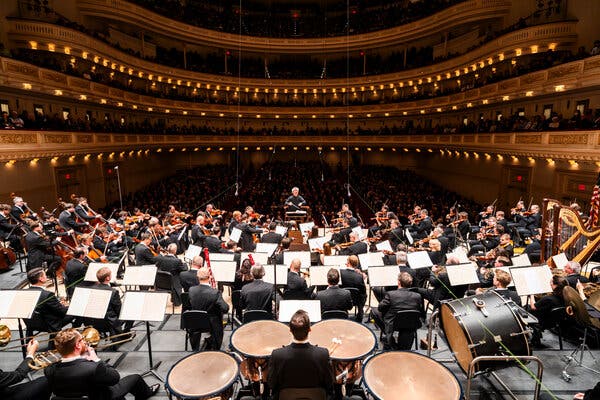The Czech Philharmonic, one of the most revered orchestras in the world, has been a beacon of musical heritage since its inception. Known for its masterful interpretations of Czech composers such as Antonín Dvořák, Bedřich Smetana, and Leoš Janáček, the orchestra has also gained recognition for its global performances, including its celebrated appearances at New York’s iconic Carnegie Hall.
The Birth of the Czech Philharmonic
Founded in 1896 in Prague, during a time when the city was blossoming as a cultural hub in Central Europe. The orchestra was created as an extension of the National Theater Orchestra and quickly became a symbol of Czech national identity. Its inaugural concert, conducted by Antonín Dvořák, featured his symphonic poem My Country and marked the beginning of a rich musical tradition.
Antonín Dvořák’s Influence:
As its first conductor, Dvořák laid the foundation for the orchestra’s dedication to Czech composers, shaping its identity and repertoire.
Janáček and Smetana:
Over the years, the orchestra became synonymous with performances of works by Janáček and Smetana, bringing Czech music to international prominence.
World Wars and Resilience:
The orchestra faced challenges during both World Wars but emerged as a symbol of resilience, continuing to perform and preserve Czech musical heritage.
Post-War Recognition:
In the latter half of the 20th century, the Czech Philharmonic expanded its reach, performing across Europe, Asia, and the Americas, solidifying its reputation as a world-class orchestra.
Czech Philharmonic’s Global Presence
The Czech Philharmonic is not just a national treasure; it is a global ambassador of Czech culture. Its international tours have introduced audiences to the depth and beauty of Czech music while demonstrating the orchestra’s versatility across diverse repertoires.
Notable International Achievements:
•Touring Across Continents:
The orchestra has performed in some of the most prestigious venues, including the Royal Albert Hall in London, the Berlin Philharmonie, and Tokyo’s Suntory Hall.
•Connection with Renowned Conductors:
Under the batons of legendary conductors such as Václav Talich, Rafael Kubelík, Jiří Bělohlávek, and Semyon Bychkov, the Czech Philharmonic has reached new artistic heights.
•Recording Legacy:
The orchestra’s recordings of Dvořák’s symphonies and Smetana’s Má vlast are considered definitive interpretations, revered by classical music enthusiasts worldwide.
The Significance of Carnegie Hall
Carnegie Hall in New York City is not just a concert venue; it is an emblem of artistic achievement and cultural exchange. Since its opening in 1891, Carnegie Hall has hosted the greatest artists and orchestras, becoming a stage where legends are made.
For the Czech Philharmonic, performing at Carnegie Hall represents a bridge between Czech musical heritage and the global classical music community. Their appearances at this iconic venue are not merely concerts; they are cultural events that celebrate the shared human experience of music.
The Czech Philharmonic’s Journey to Carnegie Hall
The Czech Philharmonic first performed at Carnegie Hall in the mid-20th century, introducing American audiences to its extraordinary sound. Over the years, its appearances at Carnegie Hall have been marked by memorable performances that highlight the orchestra’s artistic excellence.
Highlights of Carnegie Hall Performances:
1950s Debut:
The orchestra’s early performances at Carnegie Hall featured works by Dvořák and Smetana, earning critical acclaim for their authenticity and passion.
Janáček’s Global Moment:
In the 1980s, the Czech Philharmonic brought Janáček’s works to Carnegie Hall, showcasing the complexity and beauty of his compositions to an enthusiastic American audience.
Recent Performances:
In recent years, under the direction of Semyon Bychkov, the orchestra has continued to captivate Carnegie Hall audiences with a mix of Czech classics and broader European repertoire.
Cultural and Musical Significance
The Czech Philharmonic’s performances at Carnegie Hall are significant for several reasons:
Promoting Czech Heritage:
Each performance highlights the richness of Czech musical tradition, bringing works by Dvořák, Smetana, and Janáček to the forefront of global classical music.
Cultural Diplomacy:
The orchestra serves as a cultural ambassador, fostering goodwill and understanding between the Czech Republic and the world.
Artistic Excellence:
Their performances demonstrate the orchestra’s technical precision, emotional depth, and ability to connect with audiences across cultures.
Challenges and Triumphs
The Czech Philharmonic’s journey to global recognition has not been without challenges. Political upheavals, wars, and the pressures of international touring have tested the orchestra’s resilience. However, its ability to adapt and thrive has made it a symbol of perseverance and artistic integrity.
Adapting to Change:
The orchestra has embraced modern technology and global collaboration to remain relevant in the 21st century. Its live-streamed performances and digital recordings have brought its music to a wider audience, ensuring that its legacy endures.
Future Prospects: Continuing the Legacy
As the Czech Philharmonic continues to evolve, its connection to Carnegie Hall and the global stage remains central to its mission. Upcoming performances at Carnegie Hall promise to introduce new generations to the orchestra’s brilliance, ensuring that its legacy continues to grow.
What’s Next?
•Expanding Repertoire:
While remaining committed to Czech composers, the orchestra is exploring contemporary works and collaborations with living composers.
•Educational Outreach:
Through masterclasses, workshops, and educational programs, the Czech Philharmonic is nurturing the next generation of musicians and audiences.
Impression
The Czech Philharmonic’s journey from Prague to Carnegie Hall is a testament to the power of music as a unifying force. Through its performances, the orchestra, steeped in tradition yet forward-looking, continues to inspire audiences worldwide.
As it takes the stage at Carnegie Hall, the Czech Philharmonic not only showcases its extraordinary talent but also reaffirms the enduring relevance of classical music in a rapidly changing world. Its story is one of passion, resilience, and an unwavering commitment to artistic excellence—a legacy that will undoubtedly resonate for generations to come.
No comments yet.








